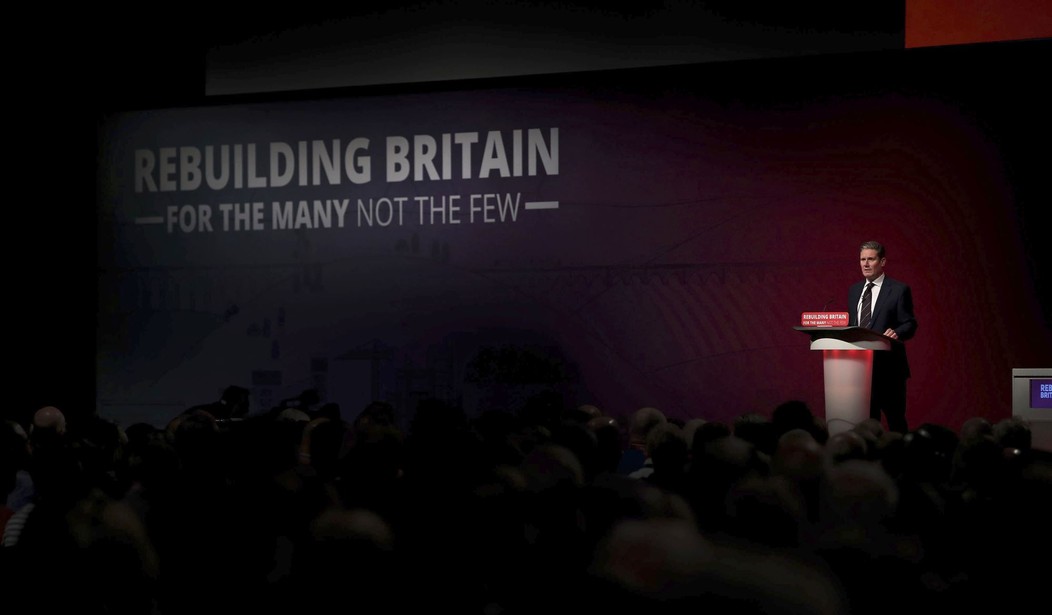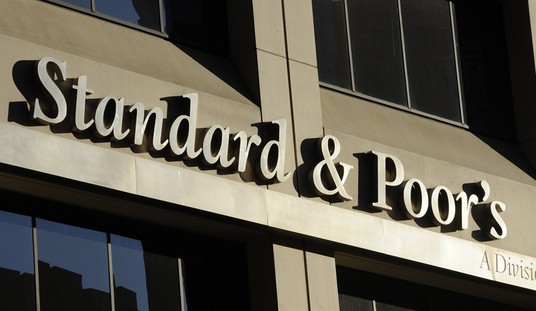It's not like they really had a choice the way their system is set up and the almost total lack of appreciable differences between the two main parties. The 'conservative' Tories had held the reins of power for 14 increasingly shaky years, the last two under the inept and effete Rishi Sunak.
The final nail in Sunak's projectile-studded political coffin was his tone-deaf early scuttle back to England from the 80th anniversary Normandy ceremonies. Sunak did so as not to miss a friendly - although God knows he needed one - prearranged television interview. It was inconvenient for his flailing camping when commemorative duties with the handful of century-old D-Day survivors interfered by running over a bit. Seen one geriatric war hero, you've seen them all, and Sunak made a command decision to ditch the patriotic party and head home.
Even in the barely recognizable England of today, that disrespect to the surviving veterans of one of England's most storied moments was the last straw.
British voters were already signaling that Sir Keir Starmers' Labour party - with its terrifying, dystopian Green vision of the British future, pro-immigrant, and radical gender ideological partners - was going to receive a commanding portion of however many voters went to the polls. Although it would be more out of sheer disgust and wishing to punish the Tories than any wild support for Labour itself, it was shaping up to be Labour's biggest victory in decades.
The only thing to shake-up the inevitability of Labour's march to domination was the mid-June electioneering emergence of perpetual political pain-in-the-elite-tookus, Nigel Farage, whose populist rhetoric and firebrand delivery took the campaigns by storm. Tories cursed the day he was born and Labour shook their heads in disgust at the nerve.
The way British elections are set up, there was no way for Farage to win a majority of seats to begin with. His 3-week campaign was about disruption and building a coalition for the next round of elections a few years hence. Farage was hoping for as many as 13-18 seats, which would give him enough heft to be able to throw a wrench in Labour's plans.
The UK went to the polls last night, and, as expected, Labour swept up.
- Keir Starmer has met with King Charles at Buckingham Palace and officially accepted the role of Prime Minister of the United Kingdom. After addressing the nation from 10 Downing Street, he entered the residence's famous black door to start work.
- Starmer's Labour Party has handed a brutal defeat to the Conservatives. He replaces Rishi Sunak. With vote counting ongoing, Labour has already won 412 seats in Parliament, versus 121 for the Conservatives — the fewest seats in their history. There are 650 seats.
- Sunak, who surprised the country six weeks ago when he called for elections in one of the U.S.' most important allies and the world's sixth-largest economy, apologized to the nation for his party's performance as he left the prime minister's residence for the last time.
NBC was as gracious as ever to someone who is not part of their favoured demographic or the causes they promote. Please take note of the petty, catty Farage disparagement.
- On his eighth attempt, pro-Brexit, anti-immigration campaigner Nigel Farage has won a seat in Britain's Parliament. The Reform UK leader and friend of Trump, will represent Clacton, a fading seaside town southern England.
MEEOOOOWWWW
It was a low-intensity election in any event, with a beaten-up, cast-down British electorate resigned to believing not much was going to change regardless if they voted or not.
Participation in Britain’s general election was predicted to be at 60 percent, according to the BBC, close to a record low, in a shift that appeared to reflect disillusionment with mainstream politics.
Keir Starmer became prime minister after a resounding win on Thursday, sweeping out the Conservatives after 14 years. The outcome was widely expected, a factor that may have led some voters to stay home.
But the low turnout shows the enormous challenge ahead for Mr. Starmer. He is taking the helm at a time when many Britons are skeptical of the government’s ability to fix the ailing National Health Service, revamp the stalling economy and increase access to public services, which have faced deep cuts over the last decade.
The only interesting outcome worth watching was Farage's reform party - how many seats were they able to pick up in that truncated time period?
I haven't the first clue how any of this works, and it's much too early to start drinking to try to work through it but lemme tell you - it sure looks completely whack to me.
Woke up to Labour winning the UK election. No surprises there.
— Miss Jo (@therealmissjo) July 5, 2024
But you can see the problem with the UK system quite clearly: @Nigel_Farage and @TiceRichard both won their Reform seats.
And @reformparty_uk has 3.3m votes but only 4 seats.
Lib Dem has 2.5m votes but 48 seats.… pic.twitter.com/46bFqIeYhK
Maybe it's like our big blue cities swamping with numbers?
It's so ridiculous that with 4 million votes, Reform UK got only 4 seats so far.
— Captain Laika (@TheCaptainLaika) July 5, 2024
With 3.4 million votes, Liberal Democrats got 71 seats.
And with only 190,000 votes, a different party got the same amount of seats as Reform UK who got 3,880,000 more votes. pic.twitter.com/0CBtlLCEg8
As I said, haven't a clue. But Reform is on its way, after 4.4M votes and however many "counts" it takes them (?!) to...5 seats.
Onto the 3rd count where Reform UK candidate, James McMurdock was ahead in South Basildon and East Thurrock Constituency. On the 1st Count was ahead by 120 Votes and ahead on the 2nd count
— Marion Alice (@marion1_alice) July 5, 2024
Reform UK should have their 5th MP, James McMurdock MP soon @reformparty_uk @Nigel_Farage pic.twitter.com/ldD47Cri8m
WHOOP DEE DOO
I have found a primer on this madness if you are remotely interested and your head doesn't hurt already. DO try to keep up.
And for God's sake, don't think like a Yank.
...With 641 constituency results declared, Labour has won 410 seats, the Tories 119, Lib Dems 71, Reform four and the Greens four.
But that is under our first past the post system.
Under proportional representation, however, the results would have been wildly different with Reform winning 93 seats.
...Originating as far back as the Middle Ages, the first past the post system concentrates the power of a person’s vote on a specific local candidate rather than a national party.
This means a single ballot has no significance beyond the constituency where it is cast and it is often the case that a party can achieve a high proportion of the national vote but win no seats.
The alternative is a system that uses proportional representation where the number of MPs a party has is based on their share of the national vote.
Critics of first past the post argue that it makes many people’s ballots meaningless if they live in constituencies with huge majorities for one party.
Got all that?
"This is not okay. This is perverse!"
— Alec Cave (@AlecCave) July 5, 2024
Reform UK - 4 million votes - 4 seats
Lib Dems - 3.5 million votes - 71 seats
Labour - 34% vote share - 64% seat share
"We need proportional representation!" pic.twitter.com/osRUloYDry
I doubt the party in power will ever vote to rescind past-the-post, right?
As if that wasn't bad enough or couldn't sound any more rigged (Hah!), there's another quirk of British elections that I was yesterday old when I first found out about it.
And if you think this past-the-post business is BS, wait 'til you hear about the "Commonwealth voters" like Rishi Sunak's wife.
What does that mean?
It means that, if you're an arrival to England from any country that used to belong to the British Empire or was - maybe still is - part of the "Commonwealth," and you want to vote IN A BRITISH ELECTION, you may legally do so.
Have at it, "commonwealth" illegal who took a boat across the Channel from France after hiking in from, say, Nigeria - vote against the anti-immigrant guy.
Reuters article on commonwealth citizens voting in the upcoming election
— Tony Dowson (@TonyDowson5) July 2, 2024
"Oyinkansola Dirisu said she was looking forward to voting for Labour, and said she wanted whoever won power to make it easier for people like her to move to Britain." pic.twitter.com/16V5sma5so
Vote for your Nigerian - Indian - whatever interests. You're not British, and a British citizen couldn't vote in your country's elections. But the British let your immigrant-of-whatever-status determine British policy as long as your former home belonged to the Empire.
Isn't that schweet? This is reparations for colonialism on crack.
Why did I mention former Prime Minister Rishi Sunak?
Because the Prime Minister of England's wife is not a British citizen. She's an Indian citizen.
And she voted in the British national election.
Rishi Sunak, accompanied by his wife, arrived at a polling station in Yorkshire to cast his vote in Thursday’s elections
— Urim.Duka (@Urim50302666) July 4, 2024
Wonder who he voted for…#UKElections #RishiSunak - Boost pic.twitter.com/dfDg1AfUMf
One would assume for her husband, but then rumor has it she wants to move to California, so maybe not.
And we're not talking about a couple thousand random immigrant votes, you know. There's a buttload of these suckers in the country.
There are 1.4 million Commonwealth citizens in the UK, all of whom can vote - that's about the same number as voted in Wales at the last election (1.5 million).
— Sam Bidwell (@sam_bidwell) July 2, 2024
This is an absurd dilution of the rights of British citizens. Foreign citizens should not be voting in UK elections! https://t.co/xJmThgA9l7
Think Labour's going to change that?
HAH!
Actually, the more you learn about how jacked up the UK is, it's a frickin' miracle Farage has gotten what he's gotten.
I hope there's something left for him to salvage if they get through the next couple of years.








Join the conversation as a VIP Member